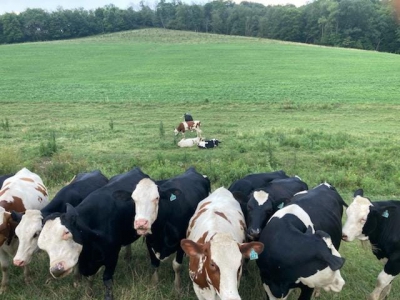Cows of a different color: Hybrids let dairy farmers produce milk with fewer resources
Some local dairy herds are changing color and getting shorter. That's a good thing, according to a man who consults with area dairy farms.
 What does the future hold for UK beef farming?
What does the future hold for UK beef farming? A further shift from suckler- to dairy-bred beef, greater emphasis on carbon credentials and solid demand are the key forecasts for the beef sector.
 Adapt winter milking routines to keep milk quality high
Adapt winter milking routines to keep milk quality high Start using a post-dip with a higher level of emollients to protect, heal and soften teat skin.
 Winter feed costs dependent on forage prices
Winter feed costs dependent on forage prices Agricultural business specialist Brent Carpenter and livestock specialist Gene Schmitz looked at how current prices affect winter feeding costs for several
 Asia Coffee-Vietnam dull as holiday mood drags, Indonesia subdued
Asia Coffee-Vietnam dull as holiday mood drags, Indonesia subdued Trade in Asian coffee markets in Vietnam was sluggish amid post-holiday sentiment, while stocks in Indonesia remained low, traders said on Thursday.
 Clay has multiple benefits as dairy cattle feed supplement
Clay has multiple benefits as dairy cattle feed supplement Clay supplements may improve feedstuff degradability in dairy cattle diets.
 3D technology helps dairy farmers identify sick cows
3D technology helps dairy farmers identify sick cows Current precision livestock farming applications for managing dairy cow health are often slow in identifying diseases.
 Fruit by-products provide a cheaper fiber alternative for feedlot cattle
Fruit by-products provide a cheaper fiber alternative for feedlot cattle Dried grape pomace provides a cheaper alternative fiber source for beef feedlot cattle and may improve growth performance and carcass attributes compared
 Efficient feeding during drought
Efficient feeding during drought Precision feeding can take the sting out of a drought, according to Dr Chris Landman, a feed specialist and consultant. Roelof Bezuidenhout reports.
 US: Low-quality forage prompts concerns about cattle, ruminant malnutrition
US: Low-quality forage prompts concerns about cattle, ruminant malnutrition US forage quality challenges could hinder livestock feeding and reduce body condition if mitigating steps to provide additional nutrients are not taken
 Recent inbreeding in cows linked to greater depression
Recent inbreeding in cows linked to greater depression Research shows degree of inbreeding depression higher for dairy cattle with more recent ancestors versus multiple generations in the past.
 US methane reduction project sees $3m investment in domestic seaweed research
US methane reduction project sees $3m investment in domestic seaweed research Bigelow Laboratory for Ocean Sciences is focusing on developing a feed additive from regional seaweeds to reduce methane production and improve dairy cow health
 Canola oil, nitrate play role in lowering cattle methane output
Canola oil, nitrate play role in lowering cattle methane output Supplementing beef cattle diets with nitrate and canola oil lowered methane yield and daily methane production but it does not alter the flow of microbial
 Industry wants origin of organic livestock rule finalized
Industry wants origin of organic livestock rule finalized USDA reopens proposed rule on amending origin of livestock requirements for dairy animals.
 Study explores optimal training for livestock guardian dogs
Study explores optimal training for livestock guardian dogs Bonding pen experiences produce a better livestock guardian dog (LGD). Bonding pens are fenced pastures where dogs bond with the species of their future charges
 Ruminant feed with orange leaves may reduce methane emissions
Ruminant feed with orange leaves may reduce methane emissions Use of fruit and vegetable residues also reduces burning of byproducts in field.
 Oregano extract may improve feeding rate, milk production in Jersey cows
Oregano extract may improve feeding rate, milk production in Jersey cows Supplementing transitional Jersey cow diets with oregano extract may improve social behavior, feeding rate and dry matter intake along with production
 Researchers listen in on 'conversations' between calves and their mothers
Researchers listen in on 'conversations' between calves and their mothers Researchers have been eavesdropping on 'conversations' between calves and their mothers—measuring the process of how cows communicate using detailed acoustic
 Stand out from the herd: How cows communicate through their lives
Stand out from the herd: How cows communicate through their lives Research at the University of Sydney has shown that cows maintain individual voices in a variety of emotional situations.
 Feeding highly digestible sugarcane silage may improve cattle intake, rumen passage
Feeding highly digestible sugarcane silage may improve cattle intake, rumen passage Increasing the neutral detergent fiber digestibility of sugarcane silage may boost intake and improve ruminal passage of fiber in feedlot-raised steer
